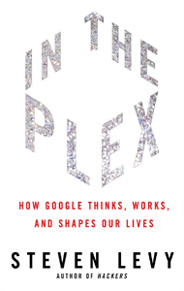After Part 1 on the technology and Part 2 about the business, here is Part 3, following chapter 3 of Steven Levy‘s In the Plex.
“You can’t understand Google,” Marissa Mayer said, “unless you know that both Larry and Sergey were Montessori kids.” [Page 121]
“It’s really ingrained in their personalities,” she said. “To ask their own questions, do their own things. To disrespect authority. Do something because it makes sense, not because some authority figure told you. In Montessori school you go paint because you have something to express or you just want to do it that afternoon, not because the teacher said so. This is really baked into how Larry and Sergey approach problems. They’re always asking ‘Why should it be like that?’ It’s the way their brains were programmed early on.” [Page 122]
Nerdy jokes
As a corporation, Google was determined to maintain its sense of play, even if it had to work to do it. The high holy day of Google culture is April 1, when imaginations already encouraged to run wild are channeled into elaborate pranks requiring months of work. The effort involves considerable organization, as ideas go through an elaborate approval process to find a place in the company’s ever-increasing roster of seasonal spoofs. The need for some oversight became clear as early as 2000, when Brin sent employees an email announcing that Google had a new valuation (meaning the estimate of its market price had gone up) and would soon reprice its employee stock options— from 25 cents to $4.01. Some people didn’t realize that $4.01 was a reference to the calendar and frantically tried to buy up all the shares that they were entitled to before the price went up. They dug into savings and borrowed from their families. Google eventually had to make people whole. [Page 123]
As the years went on, more Google divisions felt compelled to devise their own jokes, and by 2010 Wikipedia listed seventeen major April Fool’s initiatives for that year alone. [Page 123] What follows is just one example, among the most famous ones.
************ GOOGLE MENTALPLEX – APRIL FOOL 2000 ************
|
|
|
New! Search smarter and faster with Google’s MentalPlexTM |
|
 |
Instructions:
|
See our FAQ and illustrations for correct usage.
Note: This page posted for April Fool’s Day – 2000.
© Google Inc.
A unconventional company
The Bayshore Googleplex, also known as Building Zero, or the Nullplex, was the staging ground for Google to build out its culture into a sustainable corporate structure. No matter what happened, engineers would have the run of the place: their Montessori-inspired freedom would be Google’s distinguishing trait. [Page 129]
“Google is not a conventional company,” began Page’s letter, released on April 29, 2004. “We do not intend to become one.” It was an explicit warning to potential shareholders: fasten your seat belts!
In his “Owner’s Manual to Google,” Page put front and center the unofficial motto of Google, “Don’t be evil.” “We aspire to make Google an institution that makes the world a better place,” he wrote. “We believe strongly that in the long term we will be better served—as shareholders and in all other ways—by a company that does good things for the world even if we forgo some short-term gains. This is an important aspect of our culture and broadly shared within the company.” [Pages 149-50]
The impact of money making…
Even the Google masseuse noticed the impact of money, especially when it came to the divide between early employees holding valuable options and those who came later. “While one was looking at local movie times on his monitor, the other was booking a flight to Belize for the weekend,” she said in a book she wrote. “Don’t think everyone wasn’t aware of the rift.” [Pages 149-50] She became a millionaire herself.
Engineers can self-organize
Both Page and Brin believed that the company should run like the Internet itself: fast-moving, bottom up, going to work every day to make yesterday obsolete. “We were born in the Internet time,” says Megan Smith, “so our company’s like our products in some weird way.”
Google, however, had been through an early ordeal that showed that this flat-org ideal was unattainable. In 2001, Google had more than four hundred employees, reaching the point where it was impossible to pretend that it was an intimate company where everyone knew everyone else. Worse for Page and Brin, despite their best efforts, a layer of middle management was creeping in. Worse still, some of the newcomers were experienced product managers from companies such as Microsoft, whose training made them un-Googley—and those newcomers had difficulty adopting the often heretical approaches of the founders.
Brin and Page came up with a solution: Google would no longer have managers. At least not in engineering. Instead, they figured, the engineers could self-organize. That approach worked well in the nascent days of Google. If something needed fixing, people would figure out on their own what was wrong, and what was broken would be fixed. Other people would identify interesting problems in computing, and from those insights new products would arise. At the time Google had just hired Wayne Rosing to head engineering. Brin and Page figured that everyone could just report to him. The engineers would arrange themselves in pods of three, work on projects, and check in with Wayne.
That struck some of Google’s executives as madness. Stacy Sullivan, the head of HR, begged Page and Brin not to go through with it. “You can’t just self-organize!” she told them. “People need someone to go to when they have problems!”
The newly arrived Schmidt and the company’s unofficial executive coach, Bill Campbell, weren’t happy with the idea, either. Campbell would go back and forth with Page on the issue. “People don’t want to be managed,” Page would insist, and Campbell would say, “Yes, they do want to be managed.” One night Campbell stopped the verbal Ping-Pong and said, “Okay, let’s start calling people in and ask them.” It was about 8 P.M., and there were still plenty of engineers in the offices, pecking away at God knows what. One by one, Campbell and Page summoned them in, and one by one Page asked them, “Do you want to be managed?”
As Campbell would later recall, “Everyone said yeah.” Page wanted to know why. They told him they wanted somebody to learn from. When they disagreed with colleagues and discussions reached an impasse, they needed someone who could break the ties.
Nonetheless, Page and Brin were determined to go through with the plan. They called an all-hands meeting and announced it to a baffled workforce. For a few people it meant leaving the company. Others scrambled to find new roles. On the other hand, the move was welcomed by the engineers, who had been chafing at the creeping management restraints. For example, Eric Veach, who at the time was trying to invent the auction-based AdWords, later said that losing a manager had liberated him to make his breakthrough.
Ultimately, however, the plan petered out. After the initial turmoil, there was a quiet backslide where Google’s managerial class reassembled and regained a place in the structure. You just couldn’t have more than a hundred engineers reporting to Wayne Rosing. Google was taking on new engineers at a furious rate, and, brilliant as they were, the new people needed some guidance to figure out what to do. “I don’t remember Larry and Sergey saying that they were wrong and that we were right, but they agreed we could start to hire managers again, as long as the managers were good culture fits and technical enough and could be highly respected by the engineers,” says Sullivan. [Pages 158-59]
It was Marissa Mayer who told him the obvious—Page wasn’t looking for project managers who were smart enough to understand engineers—he wanted them to be engineers. Mayer suggested that Google look for computer science majors who saw themselves not just as engineers but as future CEOs. Her idea was to assemble a legion of “associate product managers.” Google would get them straight out of school, young people with no preconceptions derived from working elsewhere. Their careers would co-evolve with Google. “We value insight over experience,” says Mayer. “We take people who we think have the right raw skills and insights and put them into roles with a lot of responsibility. And while that happens with APMs, it also happens all across the company. People here might not really be accomplished or have a long career before coming to Google, but they have the right data instincts about their area.” […]That process made the managerial weakness of the APM an asset for Google, by making sure that data was at the center of decision making. [Page 161]
Ultimately, the program helped Google maintain its team approach while still focusing on engineering as opposed to the kind of more elusive un-Googley skills that an MBA brings. (One might also note that Google, in its management practices and hiring preference for freethinkers, has achieved a complete turnaround from the ethic posed in William H. Whyte’s 1956 classic The Organization Man, which describes the perfect corporate employee as “obtrusive in no particular, excessive in no zeal”—the polar opposite of a Googler.) [Page 162]
Larry’s and Sergey’s peripatetic ways could drive Googlers crazy. Even Eric Schmidt sometimes viewed them acerbically: “Larry will call and say, ‘I’m going to go visit Android,’” he says, referring to Google’s mobile phone project. “He’s not going over there to inspect—he’s going over there to have fun.” But Maria Montessori might approve. “To be … helpful,” she wrote, “it is necessary rigorously to avoid the arrest of spontaneous movements and the imposition of arbitrary tasks. [Page 166]


